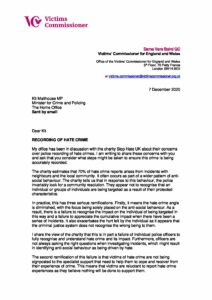Letter to Minister for Crime and Policing on recording hate crime
Dear Kit
My office has been in discussion with the charity Stop Hate UK about their concerns over police recording of hate crimes. I am writing to share these concerns with you and ask that you consider what steps might be taken to ensure this crime is being accurately recorded.
The charity estimates that 70% of hate crime reports arises from incidents with neighbours and the local community. It often occurs as part of a wider pattern of antisocial behaviour. The charity tells us that in response to this behaviour, the police invariably look for a community resolution. They appear not to recognise that an individual or groups of individuals are being targeted as a result of their protected characteristics.
In practice, this has three serious ramifications. Firstly, it means the hate crime angle is diminished, with the focus being solely placed on the anti-social behaviour. As a result, there is a failure to recognise the impact on the individual of being targeted in this way and a failure to appreciate the cumulative impact when there have been a series of incidents. It also exacerbates the hurt felt by the individual as it appears that the criminal justice system does not recognise the wrong being to them.
I share the view of the charity that this is in part a failure of individual police officers to fully recognise and understand hate crime and its impact. Furthermore, officers are not always asking the right questions when investigating incidents, which might result in identifying anti-social behaviour as being driven by hate.
The second ramification of this failure is that victims of hate crime are not being signposted to the specialist support that need to help them to cope and recover from their experience of crime. This means that victims are reluctant to report hate crime experiences as they believe nothing will be done to support them.
The third ramification is that police fail to record these incidents as hate crime. This means that hate crime is being routinely under-recorded which in turn leads to criminal justice agencies under-estimating its prevalence and impact on specific communities. This must inevitably impact upon the level of priority attached to tackling the crime and the level of resource allocated to it.
I am not sure the extent to which the police aware of this and if so, what are they plan to do about it, hence why I am copying this letter to Deputy Chief Constable Mark Harrison who is the NPCC lead on hate crime, as well as Sir Tom Winsor at HMICFRS.
Judging by the Op Talla reports, it is not clear whether there is a hate crime flag on the PNC (as there is for say domestic abuse). If this is the case, it appears to be an omission that needs to be rectified. Across all offences, there is a statutory aggravating factor which is:
“Offence motivated by, or demonstrating hostility based on any of the following characteristics or presumed characteristics of the victim: religion, race, disability, sexual orientation, or transgender identity.”
There seem to be parallels with domestic abuse here (the recognition that this type of hostility aggravates any incidence, as domestic abuse does). This suggests that if domestic abuse can be recorded the PNC, then so can hate crime.
In addition, there might also be training issues for the police so that we can be sure they are recognising hate crime and the impact it has upon the victim.
I would welcome your views on this issue of serious concern and how the Home Office, working with the NPCC, plans to resolve it.
In line with my usual practice, a copy of this letter will be placed on my website.
Yours sincerely
Dame Vera Baird QC, Victims’ Commissioner for England and Wales
CC: Sir Tom Winsor and DCC Mark Harrison

